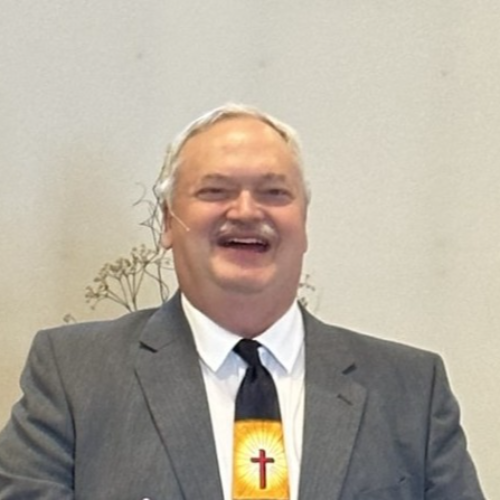-
Bury Me Standing
Contributed by Kevin Barron on Nov 28, 2017 (message contributor)
Summary: We can finish the course like Paul did!
BURY ME STANDING
2 TIMOTHY 4:6-8
OCTOBER 27, 2013
TWENTY THIRD SUNDAY AFTER PENTECOST, YEAR C
FARM HILL UNITED METHODIST CHURCH, HARRISBURG, AR
INTRO. I have mentioned before my love for the science fiction show, Star Trek. One of my favorite characters is Worf, who is a member of the Klingon race. We named one of our cats Worf in his honor, and I call myself KevintheKlingon in some places on the Internet. Worf is a fascinating character. He was orphaned as a boy and raised by humans, even though he was an alien. Many times on Star Trek he is dealing with the tension between his Klingon birth and other influences he has received from humans and so on. In one episode, though, he goes home to the Klingon planet. He is going there to defend the honor of his father and his family. His father is accused of participating in a disgraceful massacre. If this goes through, it will disgrace Worf’s family for generations.
Through a series of political maneuvers, Worf is forced to give up on his quest to clear the name of his father. An agreement, a compromise of sorts, is worked out. Worf will accept what is called a discommendation, in effect admitting that his father was guilty. Everything else, the truth, all the dirty secrets, will be swept under the table. Things will never be the same between Worf and the land of his birth. However, one final thing must be done. Worf and his captain must walk out of the assembly. All of the Klingons, including his own brother, turn their backs to Worf in his disgrace, and he and his captain silently leave the hall.
What a way to go out, to move on in life! What drama! The apostle Paul was going out with a bang as well. With all that he had done because of God and for God in his life, he had much to reflect on, much to celebrate.
Does the Bible have anything to say about these kinds of transitions? Yes, it does. In the Old Testament, Jacob, Moses, Joshua, and David each gave a farewell address. In the New Testament, Peter and Paul both wrote of their impending death in their final epistles. One’s final message is sometimes called a “swan song,” a term based on an ancient belief that the swan knew the hour of its death and announced it with a great cry or sweet song. In his swan song, what did Paul feel it was essential for us to know. What really counted when it was all said and done?
I. PAUL FINISHED THE COURSE (6-7). Say what you want about the apostle Paul, he was a finisher. He was no quitter. He was like Derek Redmond. Derek suffered an injury at the 1988 Olympics and had to drop out but was back at Barcelona in 1992 to race again. Redmond is winning his race, on the way to the finals, 175 meters from the finish line, when pop! His right hamstring blows out. He hops on his left leg a couple of times, then falls to the track. The medical staff rushes over to help. They bring a stretcher out. Tears streaming down his face, Redmond says, “There’s no way I’m getting on that stretcher. I’m going to finish my race.” He gets up and starts hobbling down the track, one painful step at a time. His dad was in the stands that day and felt the pain almost as much as Derek did. Dad raced down to the field and joined his son on the track. With a crowd of 65,000 cheering them on, they go the last 120 meters together, arms around each other. Just before the finish line, Jim Redmond releases his son and Derek crosses the finish line on his own (http://espn.go.com/ espn/ espn25/story?page=moments/94). No quit. No way. No how. That’s the way Paul was, too. What might have been running through Paul’s mind as he stood on the edge of forever?
A. Paul believed that his death was near. He said in verse 6, “I am already being poured out as a libation, and the time of my departure has come.” Paul was speaking of his soon coming martyrdom as an offering to God. He recognized that death, “my departure,” was imminent. When we know death is near, it changes our perspective on a lot of things. In John Grisham’s latest thriller, Sycamore Row, a man in the book who knows death is near does all he can to right a wrong from decades ago, one that he saw when he was just a boy. If you are preparing for departure, you have to pack in a lot of different ways!
B. Paul also believed that his fight was fought. He says in verse 7, “I have fought the good fight.” Paul waged a constant battle. He overcame all opposition. The book of Acts and 2 Corinthians 11 record some of the battles that Paul encountered. He bore the scars of battle, but he was victorious. He left to us all an example of a soldier of Christ who became all that he could be in his service to God. He left his mark upon the world of his day, and he stands head and shoulders above most of the historical figures of all time. I would say this is largely due to how he persevered and fought on in the midst of some of the most difficult of circumstances. What an inspiration and challenge to the rest of us! May we fight the battle in the ways he did.

 Sermon Central
Sermon Central



